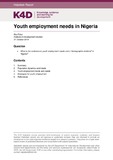| dc.contributor.author | Price, Roz | |
| dc.coverage.spatial | Nigeria | en |
| dc.date.accessioned | 2019-11-21T11:56:26Z | |
| dc.date.available | 2019-11-21T11:56:26Z | |
| dc.date.issued | 2019-10-31 | |
| dc.identifier.citation | Price, R.A. (2019). Youth employment needs in Nigeria. K4D Helpdesk Report 691. Brighton, UK: Institute of Development Studies. | en |
| dc.identifier.uri | https://opendocs.ids.ac.uk/opendocs/handle/20.500.12413/14784 | |
| dc.description.abstract | There has been increased interest in youth issues in sub-Saharan Africa in recent years, especially related to employment. Nigeria is expected to grow to over 440 million people by 2050, becoming the third most populated country in the world. Nigerians see unemployment as one of the main problems facing the country, well above poverty; the lack of job opportunities is specifically concerning for young people (World Bank, 2016). This rapid review provides a brief picture of youth employment needs in Nigeria. The job market in Nigeria is complex and multifaceted, with underemployment being a big issue. Although ‘youth’ has risen as a category in recent years, it has many definitions; young people are heterogeneous and it is often unclear to whom the label applies (Flynn et al., 2017). Furthermore, the literature highlights issues with official demographic data in Nigeria and obtaining good employment data. Hence, exact data on some aspects of youth employment in Nigeria could not be found. This review drew on a range of academic and grey literature, especially from international organisations such as the World Bank. Although this review found relevant literature from both academic and non-academic sources, it has been highlighted that there is a general dearth of published empirical research about Nigeria’s demography (Reed & Mberu, 2014). There are also discrepancies between different sources of data on population dynamics, for example official national statistics and UN estimates (possibly due to differences in measurement definitions). Gaps in evidence on youth employment include: how business reform, legal reform and infrastructure policies affect young people in practice remains weak, much finer-grained empirical research is needed; a better understanding of the very different needs, expectations, and potentials of different young people will inform better-targeted solutions (Irwin et al., 2018). | en |
| dc.language.iso | en | en |
| dc.publisher | IDS | en |
| dc.relation.ispartofseries | K4D Helpdesk Report;691 | |
| dc.rights.uri | https://www.nationalarchives.gov.uk/doc/open-government-licence/version/3/ | en |
| dc.subject | Children and Youth | en |
| dc.subject | Economic Development | en |
| dc.subject | Rights | en |
| dc.subject | Work and Labour | en |
| dc.title | Youth Employment Needs in Nigeria | en |
| dc.type | Helpdesk | en |
| dc.rights.holder | © DFID - Crown copyright 2019 | en |
| dcterms.dateAccepted | 2019-10-31 | |
| rioxxterms.funder | Department for International Development, UK Government | en |
| rioxxterms.identifier.project | K4D | en |
| rioxxterms.version | VoR | en |
| rioxxterms.funder.project | 238a9fa4-fe4a-4380-996b-995f33607ba0 | en |

